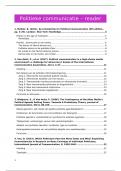Politieke communicatie – reader
1. McNair, B. (2011). An Introduction to Political Communication (5th edition.,
pp. 3–25). London ; New York: Routledge.........................................................4
Politics in the age of mediation.......................................................................................4
Reikwijdte..................................................................................................................... 4
Politiek , democratie en de media...................................................................................6
The theory of liberal democracy...................................................................................6
Publieke opinie en de publieke sfeer............................................................................8
De media en het democratische proces.......................................................................9
Democratie en de media: een kritiek............................................................................9
2. Van Aelst, P., et al. (2017). Political communication in a high-choice media
environment: a challenge for democracy? Annals of the International
Communication Association, 41(1), 3–27........................................................11
Inleiding........................................................................................................................ 11
Het belang van de politieke informatieomgeving..........................................................11
Zorg 1: Afnemende hoeveelheid politiek nieuws........................................................12
Zorg 2: Afnemende kwaliteit van het nieuws..............................................................12
Zorg 3: Toenemende machtsconcentratie en afnemende diversiteit..........................13
Zorg 4: Naar toenemende polarisatie en fragmentatie...............................................14
Zorg 5: Naar een toenemend relativisme...................................................................15
Zorg 6: Naar toenemende ongelijkheid......................................................................16
Conclusie en discussie................................................................................................... 16
3. Walgrave, S., & Van Aelst, P. (2006). The Contingency of the Mass Media’s
Political Agenda Setting Power. Towards A Preliminary Theory. Journal of
Communication, 56(1), 88–109......................................................................17
Media-agenda's: alle media zijn gelijke politieke agendabepalers?...............................17
Problemen: de kenmerken van het probleem zijn belangrijk.........................................17
Politieke agenda's: substantiële en symbolische politieke agenda's.............................18
Tijdsperiode: verkiezingen versus niet-verkiezingstijden...............................................18
Adoptie van politieke kwesties: incidentie, type en snelheid.........................................19
Gedragsdeterminanten van de politieke adoptie van mediakwesties............................19
Conclusie....................................................................................................................... 20
4. Vos, D. (2014). Which Politicians Pass the News Gates and Why? Explaining
Inconsistencies in Research on News Coverage of Individual Politicians,
International Journal of Communication, 8, 2438–2461...................................22
Inleiding........................................................................................................................ 22
Typologie....................................................................................................................... 22
1
, Selectie van de studies.................................................................................................. 23
Wie een politicus is..................................................................................................... 23
Wat een politicus doet................................................................................................ 24
Verklaringen voor inconsistente bevindingen................................................................25
Theoretische grondslagen............................................................................................. 26
Discussie en conclusie................................................................................................... 26
5. Scheufele, D. A., & Tewksbury, D. (2007). Framing, Agenda Setting, and
Priming: The Evolution of Three Media Effect Models. Journal of Communication,
57, 9-20....................................................................................................... 27
De opkomst van drie modellen van politieke communicatie.........................................27
Spaarzaamheid versus precisie: framing, agendasetting en priming............................27
Agenda setting........................................................................................................... 27
Priming....................................................................................................................... 27
Framing...................................................................................................................... 28
De verschillen op een rij zetten.....................................................................................28
Nieuwsproductie......................................................................................................... 28
Nieuwsverwerking...................................................................................................... 28
Plaats van effect......................................................................................................... 29
6. Lees-Marshment, J. (2009). What is Political Marketing?. London and New
York: Routledge........................................................................................... 30
Definitie en doel van politieke marketing......................................................................30
Belangrijke concepten................................................................................................... 30
Strategieën en technieken............................................................................................ 30
Communicatietechnieken........................................................................................... 30
Praktische toepassingen van politieke marketing..........................................................30
Ethische overwegingen................................................................................................. 31
Uitdagingen van moderne politieke marketing..............................................................31
Impact van politieke marketing op democratie.............................................................31
7. Mutz, D.C., & Reeves, B. (2005). The New Videomalaise: Effects of Televised
Incivility on Political Trust. American Political Science Review, 99(1), 1-15.. . . .33
Televisie en politiek vertrouwen....................................................................................33
Een theoretische basis voor videomalaise.....................................................................34
Onderzoeksontwerp...................................................................................................... 35
Resultaten..................................................................................................................... 35
Experiment 1.............................................................................................................. 35
Experiment 2.............................................................................................................. 36
experiment 3.............................................................................................................. 36
Populariteit van het programma.................................................................................36
Discussie....................................................................................................................... 37
2
, Conclusie....................................................................................................................... 37
8. Blais, A. & Daoust, J-F (2020). The Motivation to Vote. Vancouver: UBC Press
................................................................................................................... 38
De beslissing om te stemmen of niet te stemmen........................................................38
Het raamwerk................................................................................................................ 38
Conclusie....................................................................................................................... 39
9. Marien, S., Goovaerts, I., & Elstub, S. (2019). Deliberative qualities in
televised election debates: the influence of the electoral system and populism.
West European Politics, 43(6), 1262–1284.....................................................40
Het belang van overlegkwaliteiten op televisie verkiezingsdebatten............................40
Deliberatieve debatkwaliteiten vanuit een vergelijkend perspectief.............................41
Onderzoeksdata en methoden......................................................................................42
Verklarende variabelen............................................................................................... 42
Resultaten..................................................................................................................... 42
Grensoverschrijdend onderzoek.................................................................................42
De populistische invloed............................................................................................. 44
Conclusie....................................................................................................................... 45
10. Dryzek J. S., et al. (2019) The crisis of democracy and the science of
deliberation, Science, 363(6432), 1144-1146.................................................47
Deliberatieve democratie.............................................................................................. 47
Bevindingen uit onderzoek............................................................................................48
Implementatie............................................................................................................... 49
3
, 1. McNair, B. (2011). An Introduction to Political Communication (5th
edition., pp. 3–25). London ; New York: Routledge.
Politics in the age of mediation
Politieke communicatie is moeilijk precies te definiëren termen "politiek" en
"communicatie" hebbe, meerdere interpretaties.
Definities van politieke communicatie:
o Denton en Woodward (1990):
Discussie over:
1) Toewijzing van publieke middelen.
2) Officiële autoriteit (wie macht heeft voor wetgeving en
besluitvorming).
3) Officiële sancties (wat de staat beloont of straft).
Richt zich op verbale en schriftelijke retoriek.
o Doris Graber (1981):
Meer omvattend, inclusief:
Rhetoriek en paralinguïstische signalen (bijv. lichaamstaal).
Politieke acties zoals boycots en protesten.
Intentie als kernpunt:
o Volgens Denton en Woodward is de intentie om de politieke omgeving te
beïnvloeden cruciaal.
o Politieke communicatie: doelbewuste communicatie over politiek,
inclusief:
1) Communicatie van politici/politieke actoren met specifieke
doelen.
2) Communicatie gericht aan politici door burgers, zoals stemmers of
journalisten.
3) Mediaberichten over politieke actoren en hun activiteiten.
Uitgebreide definitie: omvat ook visuele communicatie (bijv. kleding, logo's) die
politieke identiteit vormen.
Reikwijdte
Politieke communicatie: focus op relatie tussen actoren en processen in de
politiek.
Politieke actoren:
o Politici en partijen die macht en beleid proberen te beïnvloeden.
o Partijen verschillen in ideologie (bijv. Conservatieven vs. Labour in het VK).
o Werken binnen constitutionele regels; succes afhankelijk van massamedia.
Massamedia en marketing:
o Partijen gebruiken marketing en advertentiestrategieën uit de
bedrijfswereld.
o Politieke public relations: image management, persconferenties, en
damage control.
Publieke organisaties:
o Vakbonden, consumentenorganisaties, en NGO’s met politieke doelen.
o Gebruik van lobbying en demonstraties om invloed uit te oefenen.
Drukgroepen:
4




